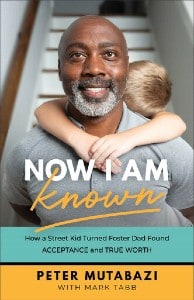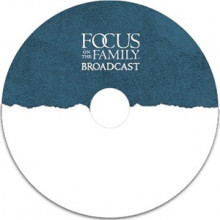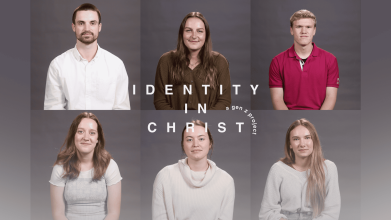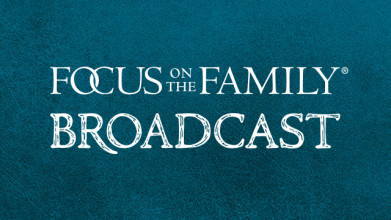Preview:
Peter Mutabazi: We all have difficult time, and sometimes we hold on the past that we fail to see the future. And that’s what he taught me. He taught me the life of Joseph. Remember what he said, “For what you meant for evil, God used it for good to save a life.” And that’s what, uh, my motto is, that, how can I use my past? Not to dwell on it or drag me into the worse, but really learning as a platform to learn so I can help those in need as well.
End of Preview
John Fuller: That’s Peter Mutabazi, and he’s joining us today to share his story of going from a child on the street to a foster dad. Uh, he’s our guest today on Focus on the Family. We’re so glad to have him and you. I’m John Fuller, and your host is Focus president and author, Jim Daly.
Jim Daly: John, I shouldn’t start at this spot, but it’s probably a good place to start. I remember, uh, we talked about our Wait No More program here at Focus on the Family. We got that going a few years ago. And it’s really to lift up the idea of engaging in the foster, um, area.
John: Mm-hmm.
Jim: And to get more Christian families involved and… I remember we, we did the broadcast, and I got home and, and Jean had heard it, and she goes, “Well, we… If we’re going to ask people to do it, we should do it.” And I was like, “Wait a minute. I was a foster kid.” I already paid, I paid the price, man.
John: Yeah. Yeah.
Jim: And she-
John: Yeah, you engaged to be like…
Jim: … just looked at me like, “What? No way. If you’re gonna ask other people to do it, we’ve got to do it.” So we did. And it’s been such an amazing journey. I think, you know, we were doing foster for about 10, 11 years. We had, I think, probably, you know, 15 kids that came in and out of the house. And two kids, particularly, we’re still engaged with them. They now live in Tennessee, but-
John: Mm-hmm.
Jim: … uh, this past summer, we went to visit with them, and we’re kinda… We’ve become like their, you know, pseudo grandma and grandpa. (laughs). So it’s great, though.
John: Mm-hmm.
Jim: And it’s been so rewarding. I’m looking forward to today’s program where we can hopefully encourage you to think about it. I mean, the Lord says, “Take care of the widow and the orphan. Here it is.”
John: Mm-hmm.
Jim: So let’s do it.
John: Yeah. And we have a great guest who’s experienced a lot of life. And his story is one of forgiveness and restoration and a lot of joy. Uh, Peter Mutabazi is an author and a speaker. And his full-time job is being a single foster dad. He does a lot of other things as well. He’s, uh, father to Anthony, and he adopted that boy back in 2020. And Peter has written a book that is really riveting. It’s called Now I Am Known: How A Street Kid Turned Foster Dad Found Acceptance And True Worth. We’ve got copies of that book. You can learn more about the book and Peter’s story at the website. That’s focusonthefamily.com/broadcast.
Jim: Peter, welcome to the program.
Peter: Well, thank you for having me here. It’s really a joy to be here with you guys.
Jim: (laughs)
Uh, you have such a great story. I can’t wait to unfold this for the YouTube watchers and the listeners. Um, let’s start with your childhood. I mean, people are going, “Okay, great. We’ve got this guy involved in foster care,” you know. But there is such a story growing up in Uganda. Tell me about it.
Peter: Yes. So I grew up in a small little village at the border of Uganda and Rwanda, and grew up poor of the poorest. Uh, it’s hard to explain to an American, what, what does poverty really mean? You know, think about. So I was born, and I wasn’t given a name until when I was two years old. The reason was because for every a 100 children were born, 60 will die before the age of two. So most moms didn’t really, uh, give names to their kids. They waited until they were two-
Jim: Mm-hmm.
Peter: … and then they will give them names.
Jim: I mean, the, uh, uh, stop and, and let’s think about that for a minute. Out of every 100 Children, born 60-
Peter: Will die.
Jim: … will not get to age two. Hmm? That should break our hearts.
Peter: Absolutely. And so think about when you get malaria and you haven’t eaten for days, the survival, the rate of survival is really small.
Jim: Mm. Mm.
Peter: So for me, I grew up, didn’t see hope. Th-there wasn’t anything around me that showed me there’s a glimpse of hope in any shape or form, you know. Uh, I didn’t have a childhood because I had to work so hard as a little boy. And then at the age of four, I began to realize that my father was different from other dads. You know, he was abusive in every shape, form you could imagine; towards me and my siblings and my mother as well. So for me, I had two things against me; poverty waiting for me outside, but my own father who was inside our home, who made life miserable in every shape, form you could imagine.
Jim: Huh…
Peter: So for me, I, I really grew up that… I didn’t know how to pray, but one prayer that I think I knew, “I wish I don’t have to see tomorrow.” Because today was hard enough that you didn’t want to repeat it.
John: Mm.
Peter: And so that’s the background that I really grew up.
Jim: Peter, in that regard-
Peter: Mm.
Jim: I mean, what you’re saying there is a little boy, four years old, five years old, you had no hope for tomorrow.
Peter: Nope.
Jim: That is, that is bleak. You ended up… You had a big decision to make at a very young age.
Peter: Correct, you know.
Jim: What was it?
Peter: So for me, what.. You know, at age 10 I thought, “Hey, look, I think my father is gonna take my life.” But why should I give him the opportunity to do so? So I think as a 10-year old, I thought, “Look, I never want my father to bury my own dead body, I would rather die in the hands of a stranger.” So I had never been 20 miles away, and I went to the bus station and I asked the lady, “Hey, of all these buses, which one goes the farthest?” Because I wanted to go as far as I could that he would never get to see me.
Jim: And you’re 10?
Peter: I’m 10, you know.
Jim: Mm.
Peter: And it wasn’t like I was looking for hope. I think for me was like life is already ended, but I’ll rather end it in the hands of someone else. So I’d never been 20 miles away, and I went 500 kilometers away, and, and I ended up in Kampala. And that’s the-
Jim: Big city.
Peter: Big city, different language, I, I didn’t know what to do. But quickly, I realized that there were other street kids, so that became my life.
Jim: And part of your existence and survival was stealing?
Peter: Correct.
Jim: Tourists were a mark for you?
Peter: Well, tourists didn’t come where we were, because it was dangerous. (laughs). You know, they didn’t come in the marketplace, you know. We were in places where locals would buy food.
Jim: Okay.
Peter: You know, where all the buses come and offload, and they use us to offload and do the labor hard work labor. And, and that was how we survived; stay busy, stay in a place where you are not isolated to be safe.
Jim: Ah.
Peter: So marketplaces were the place we could find food for us.
Jim: And you encountered somebody that showed you compassion for the first time, or at least what you received as compassion. What happened?
Peter: Well, as street kids, we had a strategy; you still while you’re helping. It’s easier to take a banana when I help you to carry a banana, a bunch of banana. So I saw a man who was wearing glasses and khaki and shoes. That was a clue for us that you can afford food, you know. So I followed him. And as soon as I followed him, he bought food, and I wanted to carry it, and he said, “Hey, no, put my food down.” So I put it down and then he said, “What is your name?” And that really rattled me because for five years, no human being had ever asked me what my name was.
John: Mm.
Peter: Kindness as a street kid meant danger. So by him asking me my name was putting me in a place where I fell, “Hey, you’re in danger. Prepare to run away.” So that’s kinda how I felt. So he gave me food before I could steal it, and he left, you know. The next week, he came back, the next week… The fourth week, I kind of knew what he drives, where he parks his car, and what time of the day he comes. So I knew one day in a week, I did not have to steal, but also I had a human being who knew my name, you know, which was key. I think hearing someone say, “Where is Peter?” I think it brought memories or the ideas of what my mother would say-
Jim: Ah.
Peter: … “Peter, where are you?” So in some way, it brought those glimpse of, you know, remembering my mom, because he would call me by my name.
Jim: Yeah. In your book, you mentioned that, um, as a street kid you didn’t have the sense or the capacity maybe, to think about dreaming. Like, “What could my life be?” I would say that would be a dream. You know, “What could I do?” “What, where could I go?” How did that interaction with this individual help you to start dreaming about your future?
Peter: Well, you, you couldn’t dream. Remember, there were more than a, you know, 3000 kids on the streets of Kampala. And we saw our colleagues die every other day.
Jim: Mm.
Peter: So a-at 10, you’re able to bury someone or see your colleague die because they ate something bad or acidic, or we slept under the bus and the bus left without checking, and there was a kid u-under, you know. So that was where your life… You waited-
Jim: Huh…
Peter: … “When is my day?” But he fed me for one year and a half. And here’s why it made a difference. I had to trust him. You know, he had to earn the right in some way to know me. And then one day, he said, “Hey, Peter, if you had an opportunity to go to school, would you love to go to school?”, you know. (laughs). And I laughed at him, because I was like, “Wait, why would I go school? School is for people who dream. School is for people who have a future. School is, is for people who have family. School is for people who are worthy. I am none of that.”
Jim: Huh…
Peter: So I said, “No, I would not go,” because he knows for me… He-here is the best way I can explain to you. It’s like me talking to you too, and say, “Hey, they’re sending people to the moon, would you like to go? But, but that’s the depth on how I looked at life, that, that wasn’t for me. I could not go to school.
Jim: Mm.
Peter: So I said no. So the next time he comes back, he said, “Hey, if you go to school, there’ll be lunch, dinner and breakfast.” Literally, I said, “What time do we go?”
Jim: Yeah, that one makes a difference. (laughs).
Peter: Exactly.
Jim: You got to eat.
Peter: No-now he said the language that I understand.
Jim: Right.
Peter: All the need, the basic need that I needed the most is what he said. But two, I had never had two meals a day in my entire life. So for him to say there’ll be lunch, dinner and breakfast, I was like, “That has to be heaven or it cannot be real.” So I went to school, more on, “This guy can talk but let me really go and see if that’s true.” So I went and cleaned my face, and, and put on the clothes he’d given me. And I had never had a pair of shoes until then. So he gave me a pair of shoes-
Jim: And you’re how old?
Peter: Now I’m 16.
Jim: 16 and never had a pair of shoes?
Peter: No shoes before. He puts me in a car and he rolls every window he had, because I think I smelled so bad-
Jim: Rolled the windows down?
Peter: You know.
Jim: (laugh).
Peter: I, I smelled so bad, but he took me to school.
Jim: Mm.
Peter: And while he’s taking me to school, I said, “Hey, there’s more than thousands of kids in the streets, why me? Why would you choose me? Why would you let me be the one to go to school?” And he said, “I just wanna be faithful.” Of course, I did not understand what that meant. But I said, “Okay.” But for me, it was more of, “I’m gonna see if there’s food.” And sure enough, there was lunch that day, you know. And then dinner came. And then breakfast. So in the process of waiting for the next meal, now I learnt not to do what I wanted to do. For example, I wanted to steal. So the kids will go to classes because it was a boarding school. So I would gather things I wanted to take. But then before I could go out, I’d say, “Wait a minute, if I take them, I’m going to miss on the dinner.” So then I’ll put them back and wait for dinner.
Jim: Uh-huh.
Peter: So you see?
Jim: Yeah.
Peter: One small thing led to staying longer and longer. If you looked in my eyes, that meant you wanna fight so I will hit you before you hit me. So the kids will look at you, and you’re like, “I’m gonna hit this kid. But if I do, I’m gonna miss the meal.” So then I would hold on-
Jim: Wow.
Peter: … you know. So small by small, now I began to realize like, “Wait a minute, I think I’m smarter than I thought,” you know.
Jim: Yeah. No-
Peter: And the food was staying as well. It wasn’t going away.
John: This is Focus on the Family with Jim Daly, and our guest today is Peter Mutabazi. And he has written a terrific book; Now I Am Known: How a Street Kid Turned Foster Dad Found Acceptance and True Worth. What a story he has, and it’s so detailed in the book. Uh, get a copy of this excellent resource when you call us. Our number is 800, the letter A, and the word FAMILY. Or stop by focusonthefamily.com/broadcast.
Jim: Peter, th-this is amazing. I, I’m, I think I feel this like the listener or the viewer on YouTube right now. We’re trying to absorb this ’cause you don’t look like your story.
Peter: Right.
Jim: Uh, kind of fast forward this, you continue with school, uh, he offers for you to go to the UK. Correct?
Peter: Well, no. So I finished high school, and then I went to university in Uganda.
Jim: Right.
Peter: And then I went to university in England and United States, so I’m a little overeducated.
Jim: But you’re learning read.
Peter: Yes. Correct.
Jim: I mean, you’re just learning to read and write.
Peter: Mm-hmm. Yeah.
Jim: I would imagine during your time in Kampala, as a street kid, you’re not taking classes.
Peter: Correct. Yes.
Jim: Right?
Peter: So quickly, I… And that’s the, the change. You know, when someone sees the best in you when you cannot see in yourself. He saw as smart, but I didn’t see it. I didn’t know. But yet he did not give up on me. And he saw the best and wanted that to come out of my life a-anyway.
Jim: That’s so amazing. And I think this man worked for Compassion International. Mm-hmm?
Peter: Correct.
Jim: So hats off to that group. I mean, they’re doing it. And this guy certainly exemplified that organization at its best.
Peter: Right.
Jim: So that is so, so good. So, uh, let’s move it forward. You get to the US, I’m sure… What’s the synopsis of that, again? You graduate from the UK. Do you go back to Uganda?
Peter: Yes, go back to Uganda, and then I came to California to study.
Jim: So you immigrated here to the US. How many years ago was this?
Peter: Oh, 20 years ago.
Jim: Okay.
Peter: So 2002.
Jim: So you’re here, I assume working away. And how did you get introduced to the foster concept?
Peter: Well, you know, first of all, I really struggled coming to United States. I think seeing how much food was thrown away, I think I began to question God’s love, like you can’t love us the same way that others can have so much to throw away that I will lose some of my families for lack of beans. So I think for me, I struggled with my faith. You know, and I went back to someone and said, “Hey, you know, read this.” And I read Psalm 139. You know, for some reason… you know, I know, i-it helped me see how David… He had so much to be grateful for.
Jim: What does it say in Psalm 139?
Peter: In Psalm 139, you know-
Jim: Yeah.
Peter: … uh, he describes on how God knows him. He knows when I sit down, he knows when I wake up, he know, he knows every intricate of what I do, even before a thought is on my, on my mind. He knows well. And so he’s seeing himself on how… His mirror is his image on how God sees him, you know. He says, “There’s nowhere I can go. If I go to hell, you’re there. If I go under the sea, you’re there.” And that really helped me to know that David didn’t say, “Thank you for the 300 words you gave me,” but he was grateful that he, God knows him when he walks. So he knows the kids in Uganda when they walk. He knows the kids in the United States. That it’s not the stuff that is based on his love, it’s how he created it. And 14, it says, “For you’re fearfully and wonderfully made,” you know. And that really helped me to say, “Okay,” you know.
Jim: Okay. (laughs)
Peter: He know me that well that well.
Jim: Just the process of believing that-
Peter: Correct.
Jim: … as this street kid-
Peter: Yes.
Jim: That’s amazing.
Peter: Absolute… Uh, but then on the other side too, Luke 12:48, “To whom much is given, much required.”
Jim: Hmm…
Peter: Then now that that, hey, of all kids, I have been in 100 countries. I am the most educated human being you could imagine. To live in the United States and use it for myself, I felt like I had been given much, in some way I needed to be accountable for it. So I didn’t know they could allow me to be a foster parent because I had traveled all over the world and I had never seen a black person who was adopting in my country, or in Eth… you know, Ethiopia or in China. They were always, you know, families that didn’t look like me. So I thought I don’t qualify. So when I walked into foster care, I said I want to mentor teenagers. It’s when the social worker said, “Hey, have you ever thought of being a foster dad?”
I said, “No, I don’t qualify. I’m single.” She said, “No, you can.” And that day, I signed up to be a foster dad. So I’ve had 34 children-
Jim: (laughs)
Peter: … adopted one and I’m also adopting the other two. But because he showed me, but also I wanted to pay it forward for what someone had done for me. I know trauma in every shape, form…
Jim: Mmm…
Peter: …that I knew I could be the best person to love on them and know where they come from. You know, uh, he saw the best potential in me that I think foster kids need that as well. And I thought I’d be th-the best parent I can be to have.
Jim: You know, it is such a great example of receiving the blessings of the Lord and not taking them and then saying, “Thank you, God. I must be a really lovable person.” You turned it around in such a beautiful way to help others that were struggling in a country that has a lot.
Peter: Mm.
Jim: You know, even our foster care system with all of its struggles and difficulties, there’s still a lot. So in that journey, I mean, there’s so many convicting points you’re making in terms of us having so much. It must be mind-blowing for you to look at America, with its Christian heritage, and go kind of, “Wake up everybody.”
Peter: Right, you know-
Jim: (laughs)
Go ahead. Unfork it.
Peter: Again, [inaudible 00:16:35] for me, if you can read the Scripture and go to that verse, “To whom much is given, much required.” I-if he gave you the best family, that means that one time you’re gonna account for that. And I wanted to. He gave me the best in the life that I wanted to be accountable for everything. You know, I’m a foster parent, and it’s my responsibility to be there for the kids in my community. It’s not someone else’s. It’s not government. It is truly my, my opportunity, and my joy to step up and do, you know. Especially the co… God didn’t say, “Hey, when you feel like, help the kids.” You know, he says, “No, if you love me, if you love me, take care of the list of these.”
And that’s something I have to honor and do, you know. It is hard. Absolutely. But he sacrificed his dad, his life and died for us. W-what, how can I say fostering is hard when he lost his life for me? Like, that’s where for me, I think I get to see grace and mercy towards me. And there’s no reason I cannot help a child. Like there’s no, no reason I can find in my DNA that can say, “Peter, no,” you know.
Jim: Yeah.
Peter: People say, you know, “I’m afraid to get attached.” Well, we want you because attachment is what our kids need, you know. Yes, it’s hard, but that’s what sacrifice means.
Jim: I just can’t imagine, uh, you know, you’ve adopted one, you have two more children that you hopefully will be able to go through the process with in-
Peter: Well, and I, and I’m fostering the other four, you know.
Jim: And… Yeah.
Peter: And if they don’t find a home, yeah.
Jim: But think of these kids coming to your home, and you tell the story. Their eyes must be huge, going, “What?” What did you live through?” “What?” I mean, they must go, “Wow.”
Peter: Right. More time is, is more on when they have trauma and that, the behaviors they have. When I see-
Jim: The credibility it brings. That’s the point.
Peter: Yeah.
Jim: That they can connect with you.
Peter: Absolutely.
Jim: You are them.
Peter: Yes. So they’re like, “You’re walked it so you understand.” But also, I know how to help them because I get it. If a kid is putting holes in my house, isn’t because they dislike me.
Jim: It’s the stress.
Peter: But there’s so much they’re in that they need to be helped. So for me to focus on the hole, I’m kind of missing the point. But really the root of why a child are coming from and be there for them. Loving their parents too. Like, it is really important for us not to judge their parents. Kinship is important. To be there for these families and say, “Hey, I know you love your child. How can I come alongside and help you have your kids back?” And that takes a lot of energy, uh, not to truly be critical, which it’s easy to do.
Jim: Yeah. Well, those are great. Just normal parenting tips, right? To help your child feel known, feel loved, etc.
Peter: Yes.
Jim: And you, you came up with 12 statements of encouragement. Could, do you have those in your head? Or can I read them?
Peter: Most of them. Yes, you know. (laughs).
Jim: Let’s hit ’em because I think it’s really good. And you said, uh, these 12 statements… And I’m sure this is what you repeat to your 34 foster kids and probably a 100 more in the future that you’re going to impact. Maybe more. (laughs). Uh, you matter. You belong. You are loved. You are seen. You are chosen. You’re a gift. You’re not alone. You’re enough. You’re heard. You are brave. (Whoo) You are special. You are known. I mean, it brings tears to my eyes. That sounds like what Jesus would say to them.
Peter: Right. But those are the words the man used, because he, he used my negative to put in positive. So he would say, “Peter, I will never survive on the streets for one night. For you to live on the streets for almost six years, you’re the bravest human being I’ve ever met.” So he, what I saw as negative, he kind of really showed me like, “Oh, okay, I, I’m brave.” Uh, b-but that’s kind of how he truly changed my life, by using those words, because I had never heard about them. I’m a g… You know, wait, I’m a gift? You know. I’m chosen? Wow. And those really helped me, learned to value myself, and in some way, get to do better because I began to believe in myself.
Jim: Peter, just a couple of observations. We’re right down at the end, but I think it’s so important. One is the Lord has given you an incredible seat in this life, because so few people have made that journey that you’ve made; from abject poverty in Africa, to the US, and being a foster dad here. (laughs). So that’s one observation. Just the view that you have, and what God has done in your life, i-it’s spectacular. It’s unbelievable.
Peter: Thank you.
Jim: Secondly, the heart you have for kids and that desire to help them and to make them feel what you felt; known and loved; is equally spectacular. So let me give you a minute here. Make your best pitch for Christians in the United States. And of course, this airs in Canada as well, but these developed countries, to put the light of Christ in their heart for a moment. Make the pitch to get involved in foster care.
Peter: Yes, it, i-it is a joy. It’s a privilege that God gives us opportunity to be, to be there for these kids. And so let’s do it, you know. You’re single, and you’re waiting to get married. Well, while you’re waiting to get married, you can be a dad, you can be a mom to someone, you know. But two, it is our privilege, it is our opportunity to change a life, you know. It is yours, your and my a job to truly say, ‘I’m gonna open my house, and I’m gonna be there for a mom, a dad, a kid that needs us the most.” It is our responsibility. To whom much is given, much is required. For those extra bedrooms you have, think about it, what do you use them for?
Jim: Mm.
Peter: For the knowledge you’ve understood; you’ve gone through difficult time and you’ve learned how to be a parent, Yes, you’re the best parent that can truly teach and come alongside. Resources, I know we can’t all be foster parents, but we can all do something, you know.
Jim: Mm.
Peter: You mow the yard. Should you mow the yard for a foster family? You make best cookies and bread. Could you make extra for a foster family?
Jim: Yeah.
Peter: You love to play video games. Could you take teens who are in foster care, and say, “Hey, I’m gonna to take you every week just to play with you.” So they can see mentors around them love them in so many ways. It’s not just only foster parenting, but it’s those that come alongside that will truly change the lives of our kids who need us the most.
Jim: Well, I so appreciate the admonition that everyone can do something. And that’s your point. And we believe that here our Wait No More program, uh, Dr. Sharen Ford heads that up for us so capably. And that’s her, her cry, you know. You may not be in a position where you can actually do fostering, but be a respite provider. Give the family a break. Get qualified and allow them to, you know, let you have the kids for the weekend so they can work on their marriage, things like that. Do the laundry.
Peter: Right.
Jim: All kinds of things.
Peter: Send me a meal once a week. Yes.
Jim: But, um, you know, the ultimate is getting engaged, and maybe even adopting kids like you have done. Adopting those children that need so much love. And I’m telling you, the Lord’s heart is for the orphan.
Peter: Yes.
Jim: If you doubt it, man, read scripture. And secondly, if you work against it, I believe, as a former orphan, you’re going to be working against God’s desires for them.
Peter: Mm-hmm.
Jim: So beware that you don’t do what you can do for these kids.
Peter: Yes.
Jim: Yeah.
Peter: And it’s a benefit for us as well. Uh, I think sometimes we see it as one way, but it’s really two-way.
Jim: It is!
Peter: You know, I think I’ve come to know God’s love by learning how to love unconditionally. I’ve come to learn his grace and his mercies and his provision, because of his… You know, I am on my knees before than I ever did, that I know how to pray, because I need that every day. So there are ways on how they will improve our lives as well. Not just that we improve their lives. It’s a two, two-way.
Jim: Yeah. It’s kind of the first lesson you learn, right? “Lord, I’m here to do this good work.” And then he breaks your heart-
Peter: Exactly.
Jim: … in what you learn. This is so good. Peter, thank you for being with us.
Peter: Well, thank you for having me here… (laughs)
Jim: (laughs)
Peter: … on behalf of the kids, you know, to make sure that we are seen and heard and known for sure.
Jim: Yeah. It flew by. And I hope you pick up this great resource, Now I Am Known, by, uh, Peter Mutabazi. And what a great story? I mean, it, truly I’m floored because I’ve traveled this world, and this is an incredible, remarkable, miraculous story – your life – and I’m in awe of God for what he’s done in, in you. It’s good.
Peter: Well, thank you. (laughs)
Jim: (laughing)
Peter: And that’s what I wan… I wanted to write about. We all have difficult time, and sometimes we hold on the past that we fail to see the future. And that’s what he taught me. He taught me the life of Joseph. Remember what he said, “For what you meant for evil, God used it for good to save a life.”
Jim: Mm.
Peter: And that’s what, uh, my motto is, that, how can I use my past? Not to dwell on it or drag me into the worse, but really learning as a platform to learn so I can help those in need as well.
Jim: Yeah. You know, I’ve been saying this for about 10 years. If you look in the US, we have over… Well, probably about 350, 360,000 churches. And this has been a, a mantra of mine. You think of foster care, we have about 400,000 kids in a given year, uh, in foster care. About 100, 110,000 of those kids are available for adoption. The court has terminated parental rights.
Peter: Yes.
Jim: There’s plenty of ways to get involved. You wanna change the way people see Christianity in America? In Canada? Man, let’s get the church involved. That’s like every church just take one child. Can’t we do that?
Peter: Right.
Jim: I mean… (laughs).
Peter: And they don’t even have to take a child. Get one family you can all rally-
Jim: One family per church.
Peter: … around, and then we will do so.
Jim: Yeah.
Peter: I, I am the guy. I’m the… As much as we want, we are pro-life. We wan-wanna make sure our children are born. It’s the same, that we are there through and through.
Jim: Yeah.
Peter: Throughout their lives.
Jim: How about the New York Times running a headline that says, “Christian Church wipes out waiting foster care list”?
Peter: Oh.
Jim: Okay. That will changed it all, so-
Peter: Oh, absolutely.
Jim: Get a hold of us, get more information about our Wait No More program. Get this great book by Peter. Uh, John, you’ll give all the details.
John: Mm-hmm.
Jim: Let’s be the body of Christ.
John: Yeah, let us tell you more about ways you can get involved in helping children in foster care through our Wait No more program. Our number is 800, the letter A, and the word FAMILY. 800-232-6459. Or you can stop by focusonthefamily.com/broadcast to make a donation and request your copy of Peter’s book, Now I Am Known. And by the way, I mentioned, uh, make a donation. Please we’re listener-supported and we rely on your generosity to continue creating programs like this and, uh, to offer folks like Peter an opportunity to advocate for children who don’t have a voice. So please join us in ministry and when you do, when you join the support team, uh, either with a monthly pledge or one-time gift of any amount, we’ll say thank you by sending Peter’s book to you. Once again, our number 800, the letter A, and the word FAMILY.
Well, have a wonderful weekend and join us again on Monday as we’ll hear from Dr. Gary Chapman. He’ll help you better understand what it takes to have a healthy family.
On behalf of Jim Daly and the entire team, thanks for listening today to Focus on the Family. I’m John Fuller, inviting you back as we once again help you and your family thrive in Christ.






















